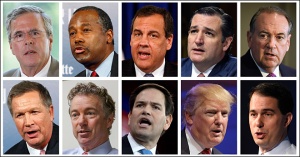The first Republican debate went as many could have predicted it would go. Domestic policy was more center stage than Donald Trump. Current and former governors touted their records in their home states. Moderators asked many candidates how they felt they would fare against Hillary Clinton. Candidates took turns lashing out at Planned Parenthood and jockeyed to appear the most pro-life.
Image credit: komonews.com
The time in the debate that was spent on foreign policy was less substantive. The prevailing wisdom of the GOP primary appears to be that ISIS deserves far more attention than any other international issue. Candidates took turns fear-mongering about the Islamic State, saying that they would take the fight to ISIS, yet always stopping short of advocating for boots on the ground (although never ruling it out either). Only Marco Rubio spoke of the need to keep the US economy competitive with overseas markets. Some candidates lamented that our military is in decline, echoing Mitt Romney’s point that the Navy has the fewest ships since 1916 (a talking point which, while technically correct, has little to no bearing on the Navy’s ability to project power: there were no aircraft carriers or ballistic missile submarines in 1916).
Nimitz Class Aircraft Carrier (not available in 1916)
image credit: ahctv.com
The consensus among the candidates on foreign policy seemed that if only we spent more money on the military (on which we already spend more than the next seven countries combined), talked tougher, and threatened more sanctions and bombings than we already do, ISIS would flee in terror, Iran would bow to any of our demands, and Putin would fall into line.
What is most notable (if unsurprising) about the Republican debate is not what the candidates talked about but what they did not.
The overwhelming majority of climate scientists say that climate change is occurring and is caused by humans. The Pentagon considers climate change to be a top threat to security in the 21st century. Around 69% of American adults are concerned about climate change. And yet, the two-hour debate concluded without a single mention of environmental issues from the candidates or the Fox News moderators.
Image credit: climatechange.procon.org
The wealthiest 0.1% of americans are worth more than the bottom 90%, and estimates of the amount of money to spent on the 2016 election are as high as $5 billion (which would more than double what was spent in 2012, itself a record-breaking year). However, the topics of income inequality and the influence of moneyed interests in politics were scarcely mentioned in the debate.
The reason that these issues were omitted in the first GOP debate is self-evident: the candidates do not want to talk about them. While a majority of Americans are concerned about climate change, the Republican base (which is vital for winning the primary) is not. Many GOP candidates deny the science behind climate change to cater to the base; but this could work against them in the general election, so it is easier just to avoid the issue. The primary may also very well be decided by who can rally the most donors to their cause, so talking about money in politics is not a winning strategy either.
In all likelihood, most or all of the candidates will avoid these issues for as long as they can, choosing instead to address the issues which their base cares about most. If there is any confusion as to what these issues are, one needs only to have watched last night’s debate.
Connor Ruby is a graduate of Clark University in Worcester, Massachusetts and a political consultant for Bulldozer Health. Connor studied comparative government at Clark as well as abroad at the University of Trier in Germany and covers politics and political processes in the US and abroad.








